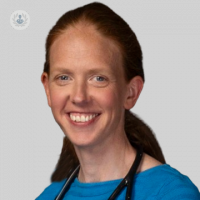Thrombosis unveiled: Symptoms, risks, and awareness
Written by:Thrombosis, a condition characterised by the formation of blood clots within blood vessels, is a significant medical concern that can lead to severe complications if left untreated. From deep vein thrombosis (DVT) in the legs to potentially life-threatening pulmonary embolisms in the lungs, thrombosis requires vigilance and awareness of its symptoms and risk factors to ensure timely intervention and prevention of adverse outcomes. Here to explain more is revered consultant haematologist, Dr Clare Rees.

What is thrombosis?
Thrombosis occurs when a blood clot forms within a blood vessel, obstructing the normal flow of blood. These clots can develop in various parts of the body, posing different risks depending on their location. In DVT, clots form in the deep veins of the legs, while pulmonary embolisms arise when these clots break free and travel to the lungs, causing potentially fatal blockages. Clots in the brain can lead to strokes, further highlighting the seriousness of this condition.
Symptoms of thrombosis
Recognising the signs and symptoms of thrombosis is crucial for prompt diagnosis and treatment. Common indicators include:
- Swelling and pain: In DVT, affected limbs may swell, accompanied by pain or discomfort, particularly when walking or standing. The affected area may feel warm to the touch, with visible redness or discoloration.
- Shortness of breath: Pulmonary embolisms often present with sudden shortness of breath, chest pain (which may worsen with deep breaths), and rapid heartbeat. Coughing up blood or experiencing a sharp pain when breathing deeply are also warning signs.
- Chest pain: Chest pain or tightness, particularly if it worsens with deep breaths or is accompanied by coughing, may indicate a pulmonary embolism and should prompt immediate medical attention.
- Neurological symptoms: In cases of thrombosis affecting the brain, such as an ischemic stroke, symptoms may include sudden weakness or numbness on one side of the body, difficulty speaking or understanding speech, vision problems, dizziness, and severe headaches.
Risk factors for thrombosis
Several factors increase the risk of developing thrombosis, including:
- Prolonged immobility: Extended periods of inactivity, such as during long flights or bed rest after surgery, can promote blood clot formation, particularly in the legs.
- Surgery or trauma: Major surgeries or significant injuries can damage blood vessels and trigger the body's clotting response, increasing the risk of thrombosis.
- Medical conditions: Certain medical conditions, such as cancer, heart disease, diabetes, obesity, and inflammatory disorders like rheumatoid arthritis, can predispose individuals to thrombosis.
- Family history: A family history of thrombosis or clotting disorders, such as Factor V Leiden mutation or antiphospholipid syndrome, can significantly elevate the risk of developing blood clots.
- Hormonal factors: Hormonal changes associated with pregnancy, birth control pills, hormone replacement therapy, or menopause can increase the likelihood of blood clot formation.


